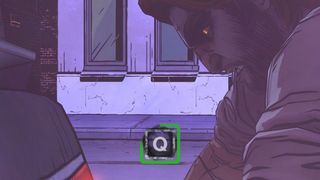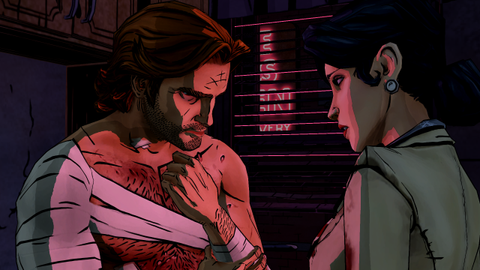Our Verdict
A fantastic, morally ambiguous detective tale that sometimes struggles to make its interactivity meaningful and fun.
PC Gamer's got your back
Rather than review the finale alone, we're reviewing the entire season of The Wolf Among Us, which is sold as a package of five episodes. We've avoided major plot details, but some spoilers are unavoidable, especially for episodes one and two. Also, no, we don't know if there will be a second season, but we're calling this "season one" in the event that there is.
I don't like hitting the 'Q' key very quickly to do things. In The Wolf Among Us, abusing the Star Trek antagonist—to win a fight, to transform into a wolf, to lift a car—ties the violence of sheriff Bigby Wolf to the strain on my finger. That interactive connection is a reason to include button mashing and quicktime events, but it's not a great solution. I enjoyed all five episodes of The Wolf Among Us—a lot—but I'm disappointed that it holds onto some of the conventions established in The Walking Dead.
Like Telltale's The Walking Dead, The Wolf Among us adapts a graphic novel series (Fables) into interactive episodes, where dialogue choices make up most of the decision-making. Telltale tells a great story, and Fables makes for a fantastically odd cast and premise: Sheriff Bigby Wolf, also known as The Big Bad Wolf, struggles to protect refugee fairytale characters in a magically-disguised New York slum. The fantasy noir is alternatingly violent (gruesomely so, at times) and tender as it hits the genre staples: murder, corruption, deceit, exploitation, self-destruction, and justice.

The Walking Dead was new and risky in 2012, but by hewing closely to the same format, The Wolf Among Us is comparatively safe. It's great for its source material and its writing, acting, character design, and ethical challenges—the same reasons The Walking Dead is great—but it struggles to express action, and can't always maintain the illusion of meaningful choice.
Scenic route
The Wolf Among Us too often pushes me from scene to scene like a TV show, especially in the final episodes. The lack of freedom to control my pace and direction is my biggest problem with the finale, which is too busy with climatic quicktime events to let me take a moment to live in Fabletown. I wanted to get some answers from Bluebeard, for instance, who does something earlier in the season that's never addressed, and to work out an issue with Mr. Toad, and to poke around Fabletown for more evidence before taking action. The brief running time (no more than 90 minutes an episode) and forced progression, however, mean certain relationships are skimmed over in the end. I'm disappointed that, in a game about decisions, I have so little control over where Bigby goes and how he handles problems.

I like walking around, even though navigating with a static camera is as awkward here as it is in The Walking Dead. It gives me a chance to feel like I live in the world instead of just observing it. My favorite sequence in The Wolf Among Us lets me visit three locations in any order and investigate them by poking through evidence at each. I'm asked to make smart decisions about where to go first and what evidence to examine, making it a rare case in games where I feel like I'm actually doing an investigation. Episodes one and three do that well, but the others keep the leash on too tight.
Most disappointing is that the response to my actions sometimes feels incongruous. At one point, for instance, I chose to interrogate a suspect by the book, and was scolded anyway. A single line of dialogue in the final episode cleared my name, but it didn't really seem to make a difference. I'm not concerned with how much my choices 'really' mean—I accept that certain events need to happen, and that Telltale isn't really building hundreds of unique branches—but the illusion must be maintained so I don't feel helpless.

When my choices do feel meaningful, The Wolf Among Us is great. And, as long as it's part of the theme and not because the characters have limited dialog, it's also great when choices don't feel meaningful. Like any good noir story, The Wolf Among Us can't be solved. The finale satisfyingly resolves the plot, but there is no right choice and there is no winning.
In the spirit of films such as Chinatown, the story is an unraveling. It begins with one murder, but over the course of the season Bigby discovers that everyone in Fabletown has something to hide and something to protect, and everyone is involved. As he grows more attached to the people he cares about—one of them's a pig, actually—he unravels in a way, too. Bigby's primary internal conflict becomes a metaphor for the plot's escalation and the line between justice and vengeance: is he The Big Bad Wolf, monstrous and violent, or the reformed sheriff, enforcing the law by the book?
The big, the bad, and the ugly
I really enjoyed being Bigby. He's compassionate, but resigned to his reputation as a violent bully and willing to use it to do his job. I love that I get to be menacing, and then feel guilty about it with Bigby, and then be sympathetic, and feel guilty with Bigby again when good intentions aren't enough. It's hard to choose lawful restraint over Batman-like vigilantism when liars and criminals are thrashing me around—my Bigby tried his best, but I was often tempted to extend his claws. I did a couple times, like when I ripped someone's arm off, but he totally had it coming.
I liked the whole supporting cast, though some get left behind as the story streaks forward, and I wish I could have developed more meaningful relationships, good or bad. Bigby's by-the-book colleague, Snow White, has too little screen time in the final episodes, but her progression is my favorite. She begins with something to prove, but becomes a confident authority figure by the end. Bigby's affection for Snow is a subtle, complex influence where it could have been dull and romantic. I felt it was manipulative at one point, when Snow is briefly the target of an apparently violent stalker, but it got much better when I stopped trying to protect Snow and started disagreeing with her.

The Wolf Among Us' best conflict is between order and compassion, which is where Telltale really finds the ethical gray area it loves so much. Do you send a struggling father and his son to 'the farm' because they can't afford the magic which keeps the Fables disguised among humans? What if Snow, the only person you trust, tells you it's necessary to keep everyone else safe? And how can you enforce the law at all when your own failings as sheriff are in part to blame for Fabletown's destitution? Why do you even want to be the sheriff, when you only seem to hurt everyone?
In the middle of the season, the fourth wall is nearly broken when Bigby is asked if he's beating down doors because he cares about Fabletown, or because he actually likes the violence. I felt like the question was directed at me, too, and I love that I didn't know how to respond—I let the timer tick down to silence. Telltale succeeds best when its protagonists' conflicts become my conflicts, making me question my decisions and what I would do in their shoes.
Those ethical challenges, and the quality of the characters and writing that make them matter, are where Telltale aces The Wolf Among Us. It ends with a polite nudge to “continue the story” with the Fables graphic novels, and I'll take its advice. Telltale got me invested and I want more—I even fear a little that the comics will disappoint me, because it won't be my Bigby in the story. I wish my choices had more meaning, and I think interactivity can be better than quicktime events, but The Wolf Among Us still feels like something I lived more than something I watched.
A fantastic, morally ambiguous detective tale that sometimes struggles to make its interactivity meaningful and fun.

Tyler grew up in Silicon Valley during the '80s and '90s, playing games like Zork and Arkanoid on early PCs. He was later captivated by Myst, SimCity, Civilization, Command & Conquer, all the shooters they call "boomer shooters" now, and PS1 classic Bushido Blade (that's right: he had Bleem!). Tyler joined PC Gamer in 2011, and today he's focused on the site's news coverage. His hobbies include amateur boxing and adding to his 1,200-plus hours in Rocket League.

